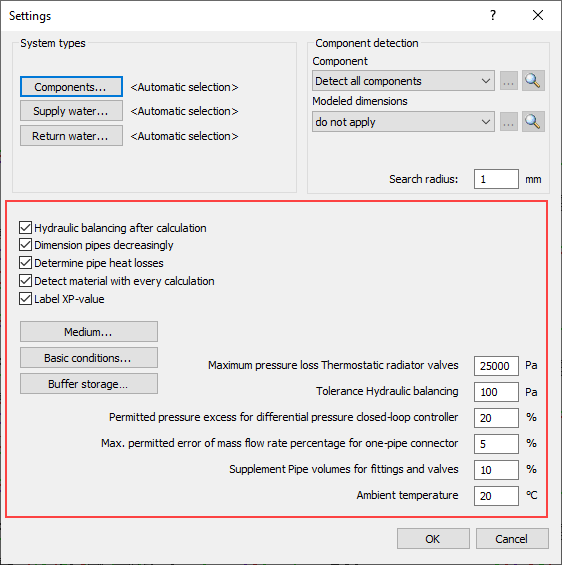Details on Calculation Presettings in Settings for Heating and Cooling
Information about the section Calculation presettings in the Settings dialog for trades heating and cooling.
Select in this section, which components and pipes are to be detected and used during pipe network calculation. The settings are saved with the project.
You are here:
Applies to: Heating, Cooling.

Medium...
Opens the dialog Medium where you can select the medium to flow in pipes. Water is used by default.
Basic conditions...
Opens the dialog Basic conditions, which allows you to change basic calculation-parameters like specifications for hydraulic balancing, upper limits for max. velocities, max. pipe friction pressure gradient as well as settings for the dimensioning of thermostatic valves, regulating valves and differential pressure closed-loop controllers.
Maximum pressure loss Thermostatic radiator valves
Determine the limit after which a note will be issued in the report dialog.
Tolerance Hydraulic balancing
Enter a limit value for the maximum difference between the pressure losses of flow paths. When exceeding that value, a note is issued in the report dialog. A message concerning missing regulating valves is not always desired, e. g. when multiple boiler systems are connected using the Tichelmann principle.
Permitted pressure excess for differential pressure closed-loop controller
When exceeding the entered value, a note is issued in the report dialog saying that automatic throttling is no longer possible behind the differential pressure closed-loop controller.
Max. permitted error of mass flow rate percentage for one-pipe connector
This percentage determines, above which deviation of the radiator mass flow rate (target vs actual) of one-pipe radiator valves an error message is issued.
Supplement Pipe volumes for fittings and valves
In order to properly dimension the diaphragm expansion tank, the fluid volume of the pipe network is needed. The volume for pipes is increased by the provided percentage to accommodate the additional volume of valves and fittings.
Ambient temperature
To calculate the heat loss of pipes, the ambient temperature, the mass flow rate, pipe length, possibly assigned insulation and fluid data is used. Ambient temperature can in addition be adjusted per section part. Ambient temperature does not affect the dimensioning of pipes.
Buffer storage
Opens the Global presettings for buffer storage dimensioning dialog in which technical data for dimensioning the buffer storage may be provided.
Hydraulic balancing after calculation
Enabled: Hydraulic balancing is carried out during calculation. All throttle- and regulating valves in the pipe network (radiator valves or regulating valves) are assigned their settings for hydraulic balancing.
Disabled: All regulating and throttling valves remain open during calculation. This allows you to see the pressure difference for each flow path and section part in the calculation dialog.
It may be helpful to turn off hydraulic balancing to see how balanced a network before being hydraulically balanced or to save time during the first network detection.
Dimension Pipes Decreasingly
Enabled: A section part will always be either as large or smaller than the one preceding it (in direction of the consumer).
Disabled: It may happen, that, when dimensioning the network, a section part further away from the network starting point is dimensioned larger than the one preceding it.
Detect pipe heat losses
Enabled: The pipe heat losses are determined per section in W/m. The heat losses of the individual section parts are displayed in the tooltip of the T column in the calculation dialog and the various key figures relating to the pipe heat losses are output in the results and in the printout. You can use the visualization to graphically display the pipe heat losses in the model.
Detect material with every calculation
Enabled: Material for the parts list is detected with each calculation.
Disabled: Material for creating the parts list is not detected with every calculation. For large project where changes in material are not to be expected, this can shorten calculation time. If this checkbox is deactivated and the function Print is used to create printouts, the question whether to detect material will be posed.
Label XP value
Enabled: When labeling valves with their values from settings, the Xp-value is also appended.
This affects the following components:
-
Throttle valves, thermostatic valves, radiator lockshield valves.
-
Radiators which these valves are part of.
-
Regulating valves.